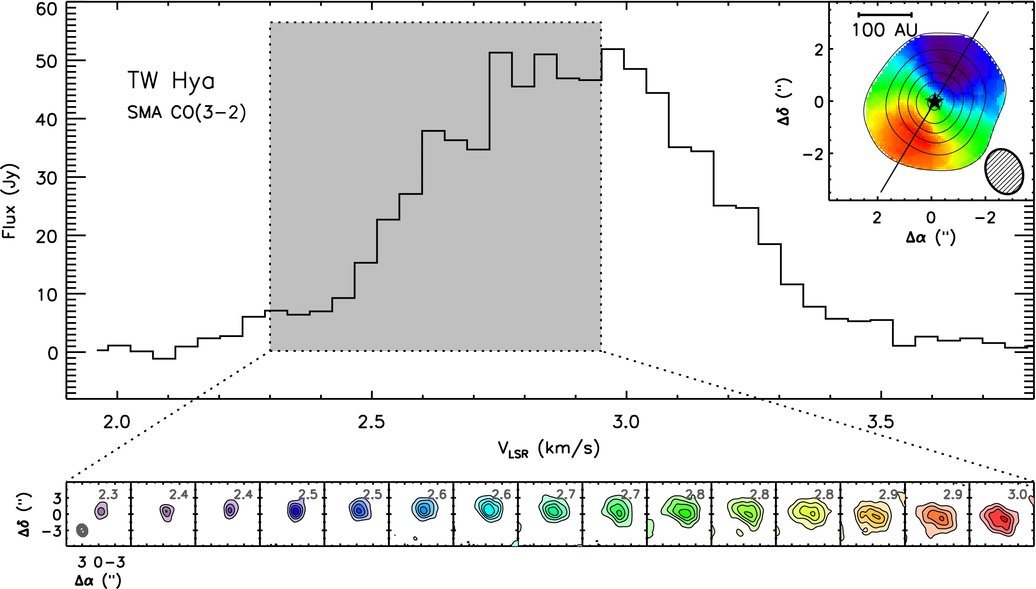TWHydraBand7 For CASA 3.3: Difference between revisions
| Line 4: | Line 4: | ||
[[Image:Hughes_band7.jpg|thumb|SMA CO(3-2) emission from TW Hya (Hughes et al. 2011).]] | [[Image:Hughes_band7.jpg|thumb|SMA CO(3-2) emission from TW Hya (Hughes et al. 2011).]] | ||
TW Hya is a pre-main sequence classical T Tauri star at a distance of about 52+/-1 pc (Mamajek 2005,2010). TW Hya is the most well known member of the TW Hydra association (TWA) of low mass stars. From a wide variety of previous observations from the infrared to submillimeter, TW Hya is known to have a small optically thin hot inner disk to radii < 4 AU, and a larger cold dust disk out to about 200 AU (see for example introduction by Vacca & Sandell 2011, and references therein). | |||
TW Hya is a pre-main sequence classical T Tauri star at a distance of about 52+/-1 pc (Mamajek 2005,2010). TW Hya is the most well known member of the TW Hydra association (TWA) of low mass stars. From a wide variety of previous observations from the infrared to submillimeter, TW Hya is known to have a small optically thin hot inner disk to radii < 4 AU, and a larger cold dust disk out to about 200 AU (see for example introduction by Vacca & Sandell 2011, and references therein). Recent optical interferometry finds that TW Hya also contains a hot optically thick disk on even smaller sizescales of ~0.5 AU, and suggests that the optically thin disk could be due to gas clearing by a planet (Akeson et al. 2011). TW Hya is still accreting from its disk at a rate of about (4-20) x 10^-10 Msun/year and most recently its spectral type, mass, and age have been estimated at M2.5V, 0.4 Msun, and 3 Myr (Vacca & Sandell 2011). | |||
==Getting the data== | ==Getting the data== | ||
Revision as of 15:41, 23 May 2011
Overview

TW Hya is a pre-main sequence classical T Tauri star at a distance of about 52+/-1 pc (Mamajek 2005,2010). TW Hya is the most well known member of the TW Hydra association (TWA) of low mass stars. From a wide variety of previous observations from the infrared to submillimeter, TW Hya is known to have a small optically thin hot inner disk to radii < 4 AU, and a larger cold dust disk out to about 200 AU (see for example introduction by Vacca & Sandell 2011, and references therein). Recent optical interferometry finds that TW Hya also contains a hot optically thick disk on even smaller sizescales of ~0.5 AU, and suggests that the optically thin disk could be due to gas clearing by a planet (Akeson et al. 2011). TW Hya is still accreting from its disk at a rate of about (4-20) x 10^-10 Msun/year and most recently its spectral type, mass, and age have been estimated at M2.5V, 0.4 Msun, and 3 Myr (Vacca & Sandell 2011).